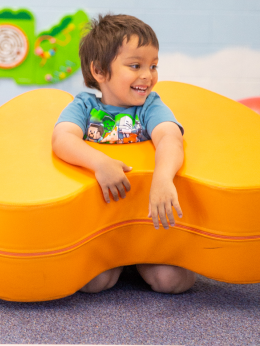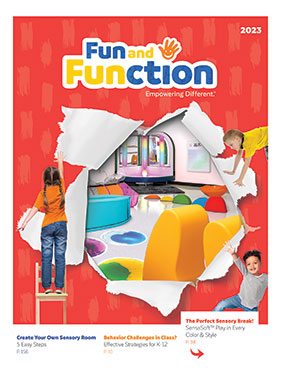Communication is universal, but speech is what makes us uniquely human.
A clear conversation can make the difference between being misunderstood and clearly understood. As an adult, communication skills are the number one factor in getting hired for a job, finding a mate or having a successful career. For children, communication can make the difference in forming friendships and being well understood by teachers, parents and other adults. Read these tips for encouraging various forms of communication:
- Talk to your children and make direct eye contact: Spend a few minutes each day discussing what happened throughout each of your days,or what you saw and read in a book. Stop to listen. Children feel many complex emotions through the day just like adults do!
- Look through a picture book that has no words: Discuss each page together and create your own stories. Remember to listen.
- Have a conversation on a toy phone with your child: Model reciprocal conversation (“my turn, your turn”), and pause to give your child their turn to talk. This is a great activity for practicing conversations with teachers, friends and other authority figures in your child's life.
- Use art to express feelings: paint, draw, express yourselves! Creativity encourages skills into so many other facets of our lives and can help many kids to get in touch with their feelings in new ways. Discuss together how an art project makes your child feel and why they made the creative choices they did.
- Learn sign language: Even “baby sign” is a language and, as long as you keep the signs consistent, this counts as a form of communication. Signing with speech will not take away from speech development.
- Enroll your child in a drama class or voice lessons: These classes are a great opportunity for kids to make new friendships outside of the traditional classroom and learn new ways of communicating with our bodies, faces, voices and more!
- Find a pen pal and communicate by email or mail: Start out with a cousin who lives far away or a school friend who recently moved. The ancient form of communication called "writing" is still a great skill to learn and can take the pressure off of face-to-face or phone conversations.
- Explore music as a form of communication: For some children, singing may be an easier form of communication and learning than speaking. Music is a powerful tool for education, memorization, and communication!
- Have your child read aloud to you at least once a week: Verbalizing reading skills helps us get used to speaking new words and phrases, all great skills for carrying over into conversation!
- Keep a journal: Guide your child to write about their school day, trips they've taken and their feelings throughout the day. This simple task can foster emotional intelligence and teach children to acknowledge and validate their feelings.
- Create a Message Box with your child: Decorate a shoebox or plastic container with paint and stickers. Then write short notes to your child to express your feelings of love, acknowledge helpful behavior, thoughtfulness and cooperation. This solidifies positive neural pathways and helps to reinforce positive behaviors when recalled, read and processed.
- Have your child call or skype their grandparents or friends regularly: It's great to keep in touch with family members who live far away and this gives kids practice speaking to adults of different age groups and backgrounds.
- Schedule a play date: To give your child and friend a good start, have some project ideas and engage in pre-planning to elicit your child's ideas too. Structured activities can help kids to interact without having to think of conversation topics. Bowling, roller skating, and arts-and-crafts are all great "ice breaker" playdate ideas!
Encouraging healthy communication skills and emotional intelligence is a muscle that you and your child can "work out" every day, and will most definitely lead to lifelong benefits! These skills are truly a gateway to the world! How do you encourage social skills? We love your ideas! Share them with us at social@funandfunction.com or reach out to us on social media!


















Comments